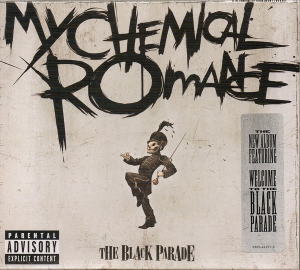My Chemical Romance – The Black Parade
Reprise Records – October 2006
This selection was chosen by Gen Z son.
Gen X dad says… It is a reflection of age to be sure, but when I think of the emo genre, the bands that first come to mind are the Promise Ring, Jets to Brazil, Burning Airlines, and more recently (at least for me) American Football. When I first discovered Jets to Brazil’s 1998 debut album Orange Rhyming Dictionary I just thought it was a solid set of songs. I was only marginally aware of the emo genre at the time. Most of it just seemed like great indie music to me.
Looking back now at its origins as a genre it is a little challenging to square what I consider emo with what My Chemical Romance created on their 2006 release The Black Parade. This kind of reaction though is why I don’t care for genres in the first place. As Miles Davis once remarked, “Good music is good no matter what kind of music it is.”
It isn’t hard to understand though why this album is such a touchstone for so many in Gen Y and Z. It is an ambitious and well constructed epic with consistent songwriting and musicianship. My main criticism of it is in the production itself. It is slick, powerful, and unrelenting. Nearly everything thing is turned up to 11 no matter the intended tone or feel of the song. For me this detracts from the story that’s being told – a cancer patient experiencing death and reflecting back in the afterlife on his existence.
All that being said, it was good experience to listen to it together with Gen Z son and get a sense of what it means for him.
Highlights for me are Dead!, This Is How I Disappear, Cancer, and Teenagers.
Gen z son says… Last year, on October 31st, 2019, the My Chemical Romance Twitter account posted a Tweet announcing a show in Los Angeles, California – their first show in 6 years, after their breakup in 2013. The titular band have been highly recognized as one of the greatest rock bands of all time, and have a massive following in the Emo community. With The Black Parade, it’s easy to see why.
Released in 2006, the album is, like all of MCR’s other albums, is a concept album, which follows the story of a man, known as “The Patient” during the final 2 weeks of his life. Music-wise, the album draws influences from alternative rock, pop-punk, hardcore punk, and even theater soundtracks. It was also re-issued in 2016 as The Black Parade/Living with Ghosts.
We start with The End, a song that opens the album with a cinematic intro in ¾ time before going into Dead!, a fast-paced song that’s simply, said lead singer Gerard Way, “about being dead, and about people not liking you”. This Is How I Disappear and The Sharpest Lives follow next, both drawing heavy alt-rock influences. Next, we get the album’s best moment: Welcome To The Black Parade. Beginning with a soft, melancholy piano solo, this song then leads into a fast, cinematic, majestic pop-rock epic, which became the band’s signature song.
I Don’t Love You follows next. Another alt-rock-influenced track, this is My Chemical Romance’s first power ballad they ever wrote – and, to quote Pitchfork, “they should definitely think about writing dozens more”. But, after that, they switch to a strange – and surprisingly catchy – combination of classic boogie-rock and power-metal for House of Wolves. Cancer, a sorrowful, melancholic piano ballad, follows: Its subject matter is, as the title states, cancer, the disease The Patient is stricken with. It was also covered in 2016 by pop duo Twenty One Pilots, which, in turn, gave them a huge emo following.
Liza Minnelli stars on Mama, a heavily musical-influenced alt-rock number with a hint of baroque-pop, a combination which was previously explored by Panic! At The Disco on their album A Fever You Can’t Sweat Out, most notably in their song There’s a Good Reason These Tables Are Numbered Honey, You Just Haven’t Thought of It Yet. Sleep then follows, which begins with a manipulated vocal sample of Way detailing a nightmare he once had. This then progresses into a grungy, hard-rock number, borrowing elements from that of Smashing Pumpkins and The Breeders. The influence of pop-punk shines on Teenagers, which deals with the subjects of bullying, gun violence, and mental health.
As the album comes to a close, Disenchanted, another power ballad lead by a mournful guitar riff, focuses on the feeling of one’s life being “meaningless”; it impeccably captures the depression that comes with said feeling with its slow, downbeat tempo and Gerard’s powerful vocals, where he sings about a “sad song with nothing to say”. But Famous Last Words finishes the album (apart from the witty hidden track Blood) on a positive note, with The Patient, about to die, accepting what is to come without fear, leaving the viewer up to decide whether death or a miracle may come.
To conclude, The Black Parade is an unapologetically majestic, staggering – and, at times, even hopeful – journey from start to finish. My Chemical Romance knows what to do, and how to do it every time. You won’t be disappointed.
- The End (1:52)
- Dead (3:15)
- This Is How I Disappear (3:59)
- The Sharpest Lives (3:20)
- Welcome To The Black Parade (5:11)
- I Don’t Love You (3:58)
- Houses Of Wolves (3:04)
- Cancer (2:22)
- Mama (4:39)
- Sleep (4:43)
- Teenagers (2:41)
- Disenchanted (4:55)
- Famous Last Words (4:59)
- Blood (1:23)



